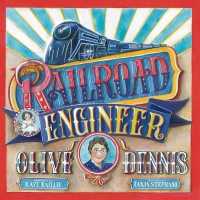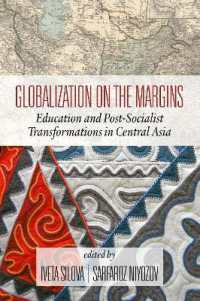Full Description
In this dynamic book, Charles Lemert elaborates a vigorous, distinctive, and creative American tradition in social thought.
American social theory has tended to be overshadowed by European social thought. Yet, looking deeper, Americans have always made important contributions to social theory. Drawing upon the work of a dazzling array of both seminal and unjustly overlooked philosophers, sociologists, litterateurs, and political activists, Lemert constructs a coherent yet variegated intellectual framework for understanding American social theory and culture from the colonial era to the present. In doing so, Lemert analyses American intellectual attitudes on race, gender, popular culture, political thought, capitalism, and social movements, while also exploring schools of thought from transcendentalism and pragmatism to interactionism and intersectionality.
In his inimitable style, Charles Lemert, a master of "finding theory where you'd least expect it," offers a masterful rendering of the American tradition in social theory. In doing so, Lemert shines new light on social theory and American history. Both authoritative and accessible, this indispensable work will be essential reading for students, scholars, and general readers with interests in social theory and American social history.
Contents
PART I: Americans Thinking America 1 What is Theory? How Can There Be a Theory of America? 2 Elements of American Social Theory PART II: American Social and Natural Spaces, 1727-1861 3 The First Fires of America's Revolutionary Culture: Benjamin Franklin, Jonathan Edwards, Thomas Paine 4 America's Revolutionary Culture Burns Bright: George Washington and Thomas Jefferson 5 Nation- State in the Making: James Madison and Alexander Hamilton 6 America Faces Its Fate: Ralph Waldo Emerson, Henry David Thoreau, Margaret Fuller PART III: Civil War and American Pragmatism, 1861-1917 and After 7 A Suffering Republic and its Culture: John Brown and Harriet Tubman 8 Balm for the Nation's Wounds: Frederick Douglass and Walt Whitman 9 Abraham Lincoln's Implicit Practical Social Theory and A New America 10 Suffering as the Seed of Pragmatism: Abraham Lincoln and Oliver Wendell Holmes, Jr. 11 Pragmatism, the Hard Realities of Change: William James, Charles Saunders Pierce, John Dewey, Jane Addams, George Herbert Mead, Richard Rorty, Cornel West PART IV: American Culture Tries to Explain its Disorder, 1919-1968 12 The Function of American Culture: Henry Adams, Talcott Parsons, Robert Merton 13 Interpreting Cultures: Robert Bellah, Clifford Geertz, Alvin Gouldner, George Marcus, Michael Fischer, Jeffrey Alexander 14 Excluded Cultures: W.E.B Du Bois, Zora Neale Hurston, Paula Gunn Allen, James Baldwin, Medgar Evers, Malcolm X, Martin Luther King Jr., Malcolm X 15 The Fungible Interaction Order: David Riesman, Erik Erikson, Edwin Lemert, Erving Goffman, Harold Garfinkel 16 Ethnographies and American Social Theory: Robert Park, W.E.B. Du Bois, W. I. Thomas, Florian Znaniecki, Elliott Liebow, Carol Stack, William Julius Wilson 17 The New Ethnographers of Urban Disorder: AbdouMaliq Simone, Elijah Anderson, Waverly Duck, Victor Rios, Matthew Desmond, Nikki Jones, Alice Goffman PART V: Reprise 18 Power, Domination, and the World Revolution of 1968: Herbert Marcuse, Kwame Ture, Bob Moses, Fannie Lou Hammer, Ella Baker, and Angela Davis Social Theories in America and the Six Elements PART VI: Identities and Differences in an Unsettled America, 1968 and Beyond 19 The Feminist Standpoint as Critical Theory: Charlotte Perkins Gilman, Dorothy Smith, Nancy Hartsock, Sandra Harding, bell hooks 20 Fractured Identities and Queer Analytics: Anna Julia Cooper, Patricia Hill Collins, Donna Haraway, Kimberlé Crenshaw Williams, Gloria Anzaldúa, Judith Butler 21 States, Social Movements, and Revolutions: The Roosevelts, Reinhold Niebuhr, Charles Tilly, Theda Skocpol, James Scott 22 Rethinking the World in the Unsettled 1960s: W.W. Rostow, Daniel Bell, C. Wright Mills, Students for a Democratic Society 23 Global Structures and Exclusions: Immanuel Wallerstein, Saskia Sassen, David Harvey, Nancy Fraser PART VII: American Futures, 1542 and 1619 to When? 24 The TimeSpace of Traveling Theory: Edward Said, Sam Han, Trịnh Thị Minh Hà, Cabeza de Vaca, Black Elk, Phillis Wheatley, Gyatri Chakravorty Spivak, Howard Zinn, E.O. Wilson








